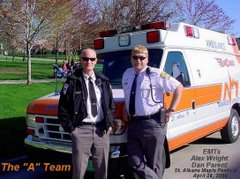A recent double fatality call prompted a CISD (Critical Incident Stress Debriefing) to be held for local responders involved in the call. I wasn't on that call, but fellow crew members were and from their casual discussion of it at quarters and while riding other calls, it was clear to me that it was a tough one. I attended a CISD for a call a couple years ago. I found it helpful. The team seemed professional and supportive, and structured a session that allowed an outlet for the images that stay with us after a bad call. I noticed that most of the attendees were responders that are volunteers: that is they don't see this stuff as often as a full time EMT or firefighter.
Which leads to my main point. Whether volunteer or paid, first responders see a lot of stuff that is just plain nasty. Stuff that makes you think and that can stay with you for longer than you want it to. The more calls you do, the more likely you'll experience stuff that sticks with you. What's the first part of the newspaper we go for? The obits. Why? For me, its a way of getting some closure. Its an opportunity to learn about the person whom you only got to know as a patient. Sometimes the obits is the only place you can find out if your patient survived.
We transport a lot of very elderly, very sick people. We even get to know them at some level. We see their names and life stories in the obits at a rate of three or four a week.
Critical Incidents? I guess not, but nonetheless, a part of the job.
How do you deal with this part of the EMT's life? Comments??
One northern Vermont Emergency Medical Technician's journey through a career in Emergency Medical Services.
Why do I write this stuff?? To chase out of my brain the daily craziness of being an EMT in a rural area, despite the great people I get to work with.
Websites of Interest
- My Facebook Page
- Enosburgh Ambulance Flying Club blog
- MedicCast - Podcasts and EMS info
- Council for the Advancement of Pre-hospital Medicine
- EMTLife.com - Great Forums for EMS providers
- Rural EMS Resources
- EMS House - Good Stuff!
- 1st Responder News
- Journal of Emergency Medical Services
- AmCare Ambulance Service's website
- EMT City - Online Forums and Discussions on EMS
- State of VT Office of EMS
- You Tube!
Disclaimer!
The views expressed in this blog are those of the author only. I write what I believe, through my experience and knowledge, to be the truth. These entries do not reflect the views, opinions, policies, or philosophies of AmCare Ambulance Service, Enosburgh Ambulance Service, or anyone related to them other than myself.
Enosburgh Ambulance's New Truck

DanVTEMT with our new Demers' Millenium ambulance
About Me
The "A - Team"

Alex and I at the Maple Festival, St. Albans, VT, April 2006
Heroes
- Robert Kennedy - A great man and visionary of his time, cut down just when this counrty really needed his leadership.
- WWII Vets - We are losing these heroes all too quickly, but they are still everywhere in our society: Tell one of them "Thank-You", you owe it to them.
- Service Men & Women overseas. Regardless of how you may feel about the war, these men and women are putting it on the line everyday.
- Neil Young - A terrific outlook on life; with a career spanning over 4 decades, his music still gives me chills. And boy can he rock on his "old black" Gibson Les Paul!
My Favorite Quotes
"Few will have the greatness to bend history itself; but each of us can work to change a small portion of events, and in the total of all those acts will be written the history of this generation."
-Robert Kennedy
"It is not the critic who counts: not the man who points out how the strong man stumbles or where the doer of deeds could have done better. The credit belongs to the man who is actually in the arena, whose face is marred by dust and sweat and blood, who strives valiantly, who errs and comes up short again and again, because there is no effort without error or shortcoming, but who knows the great enthusiasms, the great devotions, who spends himself for a worthy cause; who, at the best, knows, in the end, the triumph of high achievement, and who, at the worst, if he fails, at least he fails while daring greatly, so that his place shall never be with those cold and timid souls who knew neither victory nor defeat."
-Theodore Roosevelt
"Citizenship in a Republic,
"Speech at the Sorbonne,
Paris, April 23, 1910
-Robert Kennedy
"It is not the critic who counts: not the man who points out how the strong man stumbles or where the doer of deeds could have done better. The credit belongs to the man who is actually in the arena, whose face is marred by dust and sweat and blood, who strives valiantly, who errs and comes up short again and again, because there is no effort without error or shortcoming, but who knows the great enthusiasms, the great devotions, who spends himself for a worthy cause; who, at the best, knows, in the end, the triumph of high achievement, and who, at the worst, if he fails, at least he fails while daring greatly, so that his place shall never be with those cold and timid souls who knew neither victory nor defeat."
-Theodore Roosevelt
"Citizenship in a Republic,
"Speech at the Sorbonne,
Paris, April 23, 1910


2 comments:
I just found your blog through somebody's links. It's GREAT!! Geez -- I can't believe that nobody else has commented on this--since August even! It is something we all deal with every time the pager tones out.
I work as a quasi-volunteer (we are paid an hourly amount for being on call and a hourly wage for time on any calls) for a hospital based service in a small rural area in Oregon.
Speaking personally, I have been in attendance for several of my friends, neighbors and aquaintances worst days -- sometimes their final day(s). Sometimes the patient's or the families look at you different for awhile afterwards. But -- I feel it is one of the greatest gifts I can offer my "friend", my "neighbor", my fellow member of the community -- Being in our ambulance service I can offer them my all. I give them my best. That is all it really ever comes down to, isn't it? That is really all you can offer anyone in their final moments- to be there in the moment so they are not alone - and do what you can with what you have to change the outcome if possible. Sometimes we as a crew know we are taking somebody for their final ride. We have the time and we take the time to just "be there". To do our jobs with respect and make the extra effort to be gentle and humble. We grieve, we feel, we remember.... but we are there.
I am a fairly new EMT, but I have been running a half year and run in two rural squads.
Two days ago we went to pick up a woman at a nursing home that could be woken up. The other EMT I rode with labeled the woman as unresponsive to everything and started talking about her DNR and how soon this woman is going to die, etc.
I told the other emt to stop talking about it because often patients can hear but dont have the strength to acknowledge. At this point I grabbed the hands of the patient and said, "mrs. xxx if you can hear me squeeze your left hand" immediately she squeezed her
hand and then I proceeded to ask her yes/no questions which she answered via squeeing opposing hands. We bring her into check-in and the nurses and ER doctor hook her up, sign her chart, and practically sign her off to the ECU and didnt bother or believe that she could/would answer via her hands.
I know as a rookie EMT there is a time when we have to step away from the patient, but it kills me that noone really bothered to "deal" with her. I'm just glad she knew someone knew she was still there and wasn't going alone.
Once again as a rookie, I know I need to develop my own coping mechanisms, but after running geriatric and pediatric calls often its been hard and for me its only been 6 months.
We may wear our courage and assurance in the ambulances, but I know once I'm clear of the call there is a part of me that hurts after.
(Good blog, found through randomly googling, will keep up now! email if you'd like to istheway2 at google mail)
Post a Comment